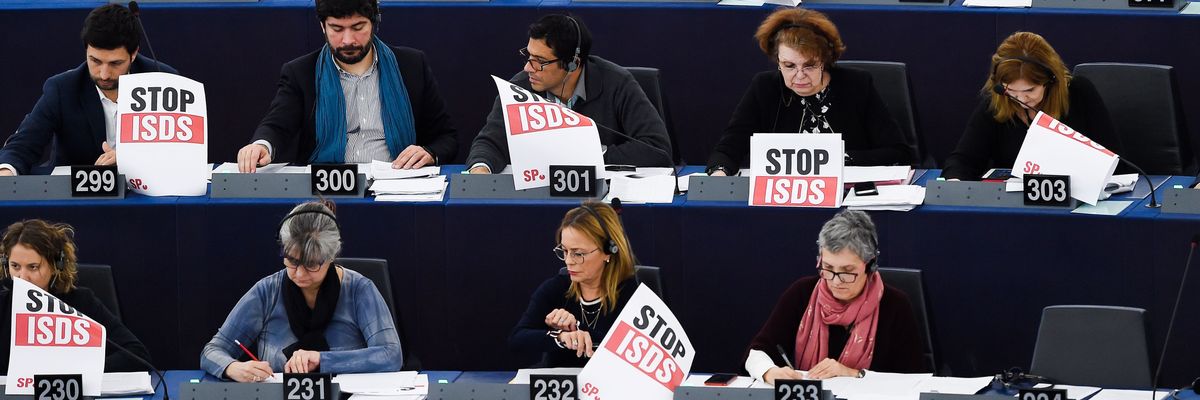A week after the European Union announced its withdrawal from the controversial Energy Charter Treaty, which has been criticized for being one of many global agreements that allow fossil fuel companies to sue governments, a coalition on Thursday released an analysis showing just how lucrative such deals have been for firms whose emissions are wreaking havoc on the planet.
The Transnational Institute, the Trade Justice Movement (TJM), Power Shift, and the Institute for Policy Studies joined forces to unveil the Global ISDS Tracker, which includes data on more than 1,300 cases that have made their way to secretive tribunals set up by investor-state dispute mechanisms in treaties including the Energy Charter Treaty.
ISDS courts allow fossil fuel companies and other large corporations to sue governments for compensation over policies that harm their profits, such as regulations to curb planet-heating emissions or air pollution, which is responsible for 1 in 5 deaths worldwide.
Many judgments made by ISDS tribunals are kept secret, but the Global ISDS Tracker revealed that $114 billion in public funds have been paid out to investors across industries, with fossil fuel companies and investors raking in $80.2 billion of that.
Another $48 billion in public money is expected to go to fossil fuel firms from ISDS disputes in the coming years if current trends continue, said the groups behind the tracker.
Tom Wills, director of TJM, said the tracker proves what trade and climate justice groups have said "for years: ISDS is the secret weapon for fossil fuel companies against climate laws."
"Corporate courts are also used to threaten governments not to give in to popular local or national demands for climate action," said Wills. "This needs to be put to an end. The data shows reform is urgently needed."
The tracker includes the $15 billion compensation lawsuit filed by TC Energy against the U.S. government when President Joe Biden canceled the company's permit to build the Keystone XL pipeline, which would have carried 830,000 barrels of tar sands oil each day.
The largest ISDS claim currently being adjudicated is Zeph Investment's case against the Australian government, which the firm says "effectively destroyed" its plans for a major mine, costing it $200 billion.
As Common Dreamsreported last November, civil society groups have called on the Biden administration to dismantle the ISDS system within the Americas Partnership for Economic Prosperity, with one campaigner arguing that ISDS was "created for and by powerful, well-organized corporations, and has served their interests almost exclusively."
Lucía Bárcena, trade policy officer at the Transnational Institute, said eliminating ISDS in treaties should be a top priority for trade and climate justice campaigners in the coming years.
"In this challenging moment, when there is more climate action needed from states," said Bárcena, "it is unbearable to have corporate courts that can wash all the efforts away."

